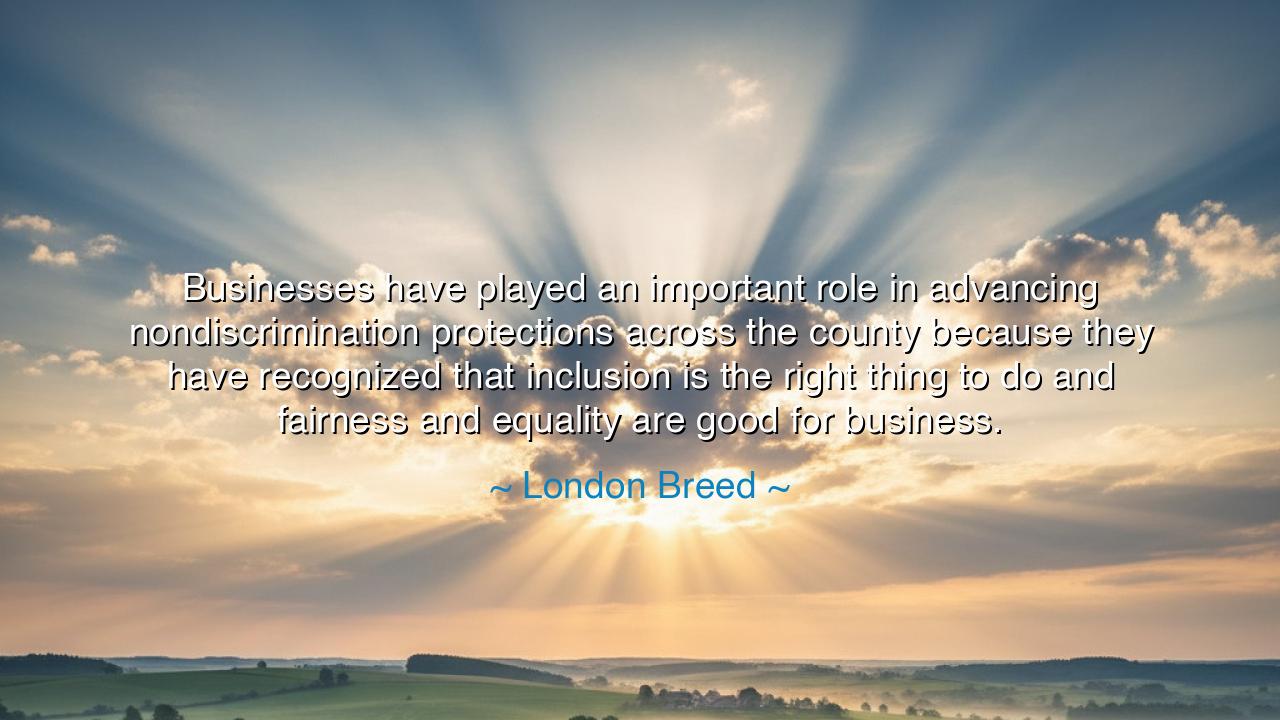
Businesses have played an important role in advancing
Businesses have played an important role in advancing nondiscrimination protections across the county because they have recognized that inclusion is the right thing to do and fairness and equality are good for business.






In the ancient pursuit of justice and fairness, the marketplace of human endeavor has always been a space where the ideals of society collide with the realities of human nature. London Breed speaks with both clarity and wisdom when she says: “Businesses have played an important role in advancing nondiscrimination protections across the country because they have recognized that inclusion is the right thing to do and fairness and equality are good for business.” These words reveal a profound truth: that the values of inclusion and fairness are not mere moral ideals, but powerful drivers of economic success and progress in society.
The ancients understood that the marketplace, as a vital part of society, was a place where principles of justice could be tested. In Ancient Greece, Aristotle spoke of the ideal city-state, where every citizen, regardless of their station, would have a role to play in contributing to the common good. He believed that true harmony and prosperity could only be achieved when all people, regardless of their backgrounds, had the opportunity to contribute meaningfully to society. This vision echoed a truth that transcends time: that inclusion—the act of opening doors to all, regardless of race, gender, or identity—is the key to societal and economic flourishing. The ancients saw that when individuals are allowed to contribute freely and fairly, the whole of society benefits.
Breed’s statement, however, speaks not just to moral integrity, but to the practical value of nondiscrimination in business. Throughout history, there have been those who viewed commerce solely as a vehicle for personal gain, seeing business as a space where equality had little place. However, there are others—visionaries—who recognize that true prosperity is only achievable when justice is embedded in the very foundation of the system. Consider, for example, the American Civil Rights Movement of the 1960s, during which businesses began to recognize the economic value of nondiscrimination. In the wake of these movements, businesses that embraced diversity and inclusion not only championed fairness, but also realized greater success. Firms that opened their doors to people of all races, ethnicities, and backgrounds often found that the influx of diverse perspectives and talents brought creativity, innovation, and ultimately, increased profits.
The story of Ford Motor Company in the early 20th century is another prime example of how businesses have embraced nondiscrimination for the benefit of both their workers and their bottom lines. Under the leadership of Henry Ford, the company made a revolutionary decision to raise the wages of its workers. Ford recognized that when workers are paid well and treated fairly, they are more productive and more loyal. This move to implement better labor practices not only improved the lives of his employees but also boosted the company’s success. Ford’s approach demonstrates that fairness and inclusion are not just moral imperatives but also essential components of a successful business model.
In the modern era, businesses that embrace diversity and inclusion continue to see similar returns. Studies show that companies with a more inclusive workforce tend to be more innovative and have better financial performance. When diverse perspectives are brought to the table, creative solutions emerge, and businesses become more adaptable to the changing global market. The tech industry, for example, has seen tremendous success in recent years as it has embraced global talent, drawing from a wide array of cultural and ethnic backgrounds. Companies like Google and Apple understand that a diverse workforce brings a wealth of ideas that drive innovation, setting them apart in a fiercely competitive market.
The lesson we learn from London Breed’s words is clear: the pursuit of equality and inclusion is not just a moral choice—it is a strategic one. Fairness, when integrated into the core values of a business, leads to stronger, more resilient organizations. Inclusion allows for greater creativity and progress, as it brings a multitude of experiences and ideas to the table. Businesses that recognize the value of nondiscrimination are not just fostering a more just society—they are also paving the way for their own success.
In our own lives, let us take this lesson to heart. Whether in the marketplace, in our workplaces, or in our personal relationships, we must embrace the values of inclusion and fairness. Let us strive to create environments where all individuals, regardless of their background, have the opportunity to thrive. In doing so, we contribute not only to the well-being of individuals but also to the prosperity of the whole, understanding that true success is built upon the pillars of equality and justice. By fostering these values, we align ourselves with the wisdom of the ancients, who understood that a truly prosperous society is one that allows all its members to reach their full potential.






AAdministratorAdministrator
Welcome, honored guests. Please leave a comment, we will respond soon